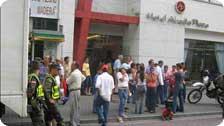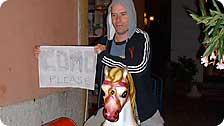by Cheri Eplin
If it takes a village to raise a child, then it takes a group of 29 Rotarians—and one sister-in-law willing to help translate—to change the lives of 143 patients, mostly children, from the university city of Pereira, Colombia.
Rotaplast, a program that provides surgical intervention to eliminate untreated cleft lips and palates, makes Danville, California Rotary President Vic Georgiou very proud.
“Truly, these doctors perform more than surgery,” Georgiou said. “It’s an art form. Sculpture, that’s what it is.”
During a typical week when most of us have gone out to dinner several times and taken in the latest action adventure movie, volunteers from the “5 Club” Rotary, which include members from Danville, San Ramon and Lafayette, joined other national Rotarians on a recent mission to Colombia. There, the volunteers performed complicated medical procedures, changing the lives of not only the individuals but also their families—forever.
Georgiou, the designated “quartermaster,” a military term used for “supply guy,” was responsible for transporting 45 cases of surgical supplies to and from Colombia. Georgiou described the narrow one-way streets to the villages as “poverty in paradise,” as he addressed the Danville Rotary members at a recent meeting.
He led fellow club members through a slide show presentation from the historical perspective to the geography of Pereira, to the more emotionally-driven photos of children lined up outside a fence where Georgiou said, “the first couple hundred were assessed and from there, most were chosen to receive surgeries. Each child, although accompanied by three to four adults, was allowed to bring only one adult into the hospital.”
Additional slides showed the smiles of those impacted by volunteer miracle workers, from a father holding a young girl named Eliana, who received cleft surgery, to the unbelievable before-and-after photos of a 55-year-old grandpa whose amazing recovery and change of appearance drew “oohs” and “aahs” from the audience, showing the dramatic change in his face after his cleft lip disappeared to reveal a new, big smile.
The Rotaplast program requires doctors, anesthesiologists, nurses, translators and other volunteers to perform complicated medical procedures for families that don’t have the money to pay for the procedures themselves. “These folks are amazing,” Georgiou states. In the Pereira mission, approximately 20 procedures were performed a day.
Paul Fisher, chairman of the board, who was team leader for this mission, said, “The doctors would take only short breaks of nourishment or take a power nap of about 20 minutes” between their busy schedules that began at 7:30 a.m. and sometimes ended as late as 8 p.m. “Sometimes, if someone would end a little early, that person would say bring another patient in—trying to increase the amount of people who could receive a much needed surgery.” Sundays were the only official day off.
“This is what it’s all about!” doctors proclaim on the mission. Fisher believes that the experience reminds doctors what drew them into the medical profession, noting that because liability differs when medical teams cross borders, the surgeons are left to focus on what they do best—perform medical miracles.
“Rotarian volunteers do all the required paperwork,” said Georgiou. And the paperwork included Post-its on the wall to keep track of candidates for surgery and performing other necessary “grunt work.”
“Every person that volunteers plays an important role,” said Fisher, “from nurses who care for these patients in their fast 24-48 hour recovery times given in the hospital, to the local Rotarians from the host country who support our efforts in the first place by providing a hospital to perform the surgeries to the continued support families receive long after the team leaves.”
Even Rotarian family members, such as Danville Rotarian Steve Grote’s mom, get involved by creating quilts as part of the “Quilt Project,” which provides each patient with a blanket of comfort that they can take home as a reminder of the program. Georgiou added, “Others pack bags filled with stuffed bears and goodies” and add these as additional parting gifts.
In 1996, Rotaplast was such a concerted effort of Rotarians that it became a separate nonprofit corporation and has since consistently expanded its number of annual missions. The program was founded in 1992 by Rotary Club President Peter Lagarias and Dr. Angelo Capozzi in collaboration with the Rotary Club of San Francisco. Their first mission facilitated a surgical program in La Serena, Chile, and treated children with the cleft lip and palate anomaly who would otherwise not receive surgical intervention.
As part of a bigger, international effort, the goal of Rotaplast is to eliminate cleft lips and palates in children worldwide by the year 2025. And with one to two missions performed each year, from China to Bolivia, the Rotary is well on its way to achieving this target.














